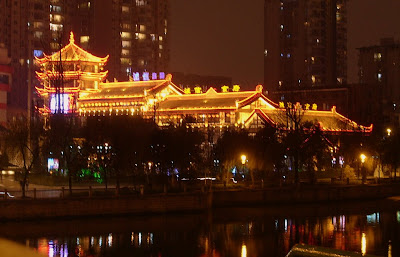The buses here are the most crowded I've ever seen, even compared to India. Before I was working I could avoid taking them during the busy times but am now figuring out crowded bus protocol. The 56 is usually so packed with people in the morning that only a few can squeeze in the front door. The driver leaves the back door open so people can board there, and then bus money and swipe cards get passed via many hands to the ticket guy at the front. The swipe cards then get passed back to their owners. If you have boarded at the front of the bus, at each stop you shuffle back a bit to position yourself near the exit by the time you reach your stop. As the bus slows down, people near the door start asking each other, 想不想?(xiăng bù xiăng, do you want to get off here) so that the passengers who plan to exit are not blocked.
Getting lost is very easy, because instead of the streets laying in a grid they radiate out from the centre. A map of the city looks like a ratty spider's web, anchored by the three ring roads. It is therefore very hard to tell which direction you are facing. One of the most helpful things for getting un-lost is a bus stop, because they usually have a city map with the relevant bus lines drawn out. The list of stops is a little more challenging to read but with a few basic characters you can figure out quite a bit:
北(bĕi, north)
南(nán, south)
西(xī, west)
东(dōng, east)
路(lù, street)
街(jiē, street)
大(dà、big)
小(xiăo, small)
门(mén, gate)
桥(qiáo, bridge)
环(huán, ring)
Many, many place names and streets contain these characters. The 环(huán) is for figuring out where you are in relation to the nearest ring road, e.g: 一环路(yī huán lù), first ring road.
My junior high students reportedly do not believe I am western, because I am 温柔(wēnroú, gentle). Last week this really bothered me, this week I am over it...teaching is great therapy for culture shock because it forces you to focus on other people.








